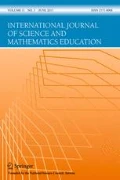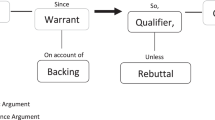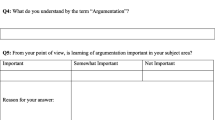ABSTRACT
The purpose of this study was to explore the impact of argumentation-based pedagogy on college students’ conceptual understanding of properties and behaviors of gases. The sample consists of 108 students (52 in the control group and 56 in the intervention group) drawn from 2 general chemistry college courses taught by the same instructor. Data were collected through pre- and post-tests. The results of the study show that the intervention group students performed significantly better than the control group students on the post-test. The intervention group students also showed significant increase in their test scores between pre- and post-test. While at least 80 % of the students in the intervention group abandoned their initial ideas on all of the 17 alternative conceptions that were identified by the authors but one, the percent of student abandoning their initial ideas in the control group was less than 50. The discussion focuses on the implications of these results for addressing students’ alternative conceptions, promoting the argumentation–pedagogy in college science courses and the challenges associated with the use of argumentation in college science classrooms.
Similar content being viewed by others
References
Aldridge, J. M., Fraser, B. J., Taylor, P. C. & Chen, C. C. (2000). Constructivist learning environments in a cross-national study in Taiwan and Australia. International Journal of Science Education, 22, 37–55.
Anderson, C. (2007). Perspectives on science learning. In S. K. Abell & N. Lederman (Eds.), Handbook of research in science education (pp. 3–30). Mahwah, NJ: Lawrence Erlbaum Associates.
Baker, M. J. (1999). Argumentation and constructive interactions. In P. Coirer & J. Andriessen (Eds.), Foundations of argumentative text processing (pp. 179–202). Amsterdam, the Netherlands: University of Amsterdam Press.
Beall, H. (1994). Probing student misconceptions in thermodynamics with in-class writing. Journal of Chemical Education, 71(12), 1056–1057.
Beeth, M. E. (1998). Teaching for conceptual change: Using status as a metacognitive tool. Science Education, 82, 343–356.
Bell, P. & Linn, M. C. (2000). Scientific arguments as learning artifacts: Designing for learning from the web with KIE. International Journal of Science Education, 22(8), 797–817.
Benson, D. L., Wittrock, M. & Baur, M. E. (1993). Students’ preconceptions of the nature of gases. Journal of Research in Science Teaching, 30, 558–597.
Bonder, G. M. (1991). I have found you an argument. Journal of Chemical Education, 68, 385–388.
Bricker, L. & Bell, P. (2008). Conceptualizations of argumentation from science studies and the learning sciences and their implications for the practices of science education. Science Education, 92(3), 473–498.
Cetin, P., Kaya, E. & Geban, O. (2009). Facilitating conceptual change in gases concepts. Journal of Science Education and Technology, 18, 130–137.
Cross, D., Taasoobshirazi, G., Hendricks, S. & Hickey, D. T. (2008). Argumentation: A strategy for improving achievement and revealing scientific identities. International Journal of Science Education, 30(6), 837–861.
Driver, R., Newton, P. & Osborne, J. (2000). Establishing the norms of scientific argumentation in classrooms. Science Education, 84, 287–312.
Duschl, R. & Grandy, R. (Eds.). (2008). Teaching scientific inquiry: Recommendations for research and implementation. Rotterdam, the Netherlands: Sense.
Erduran, S., Ardac, D. & Yakmaci-Guzel, B. (2006). Learning to teach argumentation: Case studies of pre-service secondary science teachers. Eurasia Journal of Mathematics, Science and Technology Education, 2(2), 1–14.
Erduran, S. & Jimenez-Aleixandre, M. P. (Eds.). (2008). Argumentation in science education: Perspectives from classroom-based research. Dordrecht, the Netherlands: Springer.
Griffiths, A. K. & Preston, K. R. (1992). Grade 12 students’ alternative conceptions relating to fundamental characteristics of atoms and molecules. Journal of Research in Science Teaching, 29(6), 611–628.
Hwang, B., & Chiu, S. (2004). The effect of a computer instructional model in bringing about a conceptual change in students’ understanding of particulate concepts of gas. In Paper presented in Informing Science and IT Education Joint Conference, Rockhampton, Australia.
Jimenex-Aleixandre, M. P. & Pereiro-Munoz, C. (2002). Knowledge producers or knowledge consumers? Argumentation and decision making about environmental management. International Journal of Science Education, 24, 1171–1190.
Jimenez-Aleixandre, M. P., Bugallo-Rodriguez, A. & Duschl, R. A. (2000). ‘Doing the lesson’ or ‘doing science’: Argument in high school genetics. Science Education, 84(6), 757–792.
Kautz, C. H., Heron, P. R. L., Loverude, M. E. & McDermott, L. C. (2005a). Student understanding of the ideal gas law, part I: A macroscopic perspective. American Journal of Physics, 73, 1055–1063.
Kautz, C. H., Heron, P. R. L., Shaffer, P. S. & McDermott, L. C. (2005b). Student understanding of the ideal gas law, part II: A microscopic perspective. American Journal of Physics, 73, 1064–1071.
Kelly, G. & Chen, C. (1999). The sound of music: Constructing science as sociocultural practices through oral and written discourse. Journal of Research in Science Teaching, 36(8), 883–915.
Kelly, G. & Takao, A. (2002). Epistemic levels in argument: An analysis of university oceanography students’ use of evidence in writing. Science Education, 86(3), 314–342.
Keys, C. W. (1999). Language as an indicator of meaning generation: An analysis of middle school students’ written discourse about scientific investigations. Journal of Research in Science Teaching, 36(9), 1044–1106.
Kuhn, D. (1993). Science as argument: Implications for teaching and learning scientific thinking. Science Education, 77(3), 319–337.
Kuhn, D. (2010). Teaching and learning science as argument. Science Education, 94(5), 810–824.
Latour, B. & Woolgar, S. (1986). Laboratory life: The construction of scientific facts. Princeton, NJ: Princeton University Press.
Leach, J. (1999). Students’ understanding of the co-ordination of theory and evidence in science. International Journal of Science Education, 21(8), 789–806.
Liu, X. (2006). Effects of combined hands-on laboratory and computer modeling on student learning of gas laws: A quasi-experimental study. Journal of Science Education and Technology, 15(1), 89–100.
Lustick, D. (2010). The priority of the question: Focus questions for sustained reasoning in science. Journal of Science Teacher Education, 21(5), 495–511.
Madden, S. P., Jones, L. L. & Rahm, J. (2011). The role of multiple representations in the understanding of ideal gas problems. Chemistry Education Research and Practice, 12, 283–293.
Mason, L. (1996). An analysis of children’s construction of new knowledge through their use of reasoning and arguing in classroom discussions. Qualitative Studies in Education, 9(4), 411–433.
McNeill, K. L., & Knight, A. M. (2011). The effect of professional development on teachers’ beliefs and pedagogical content knowledge for scientific argumentation. In Paper presented at the annual meeting of the National Association for Research in Science Teaching, Orlando, FL.
Mercer, C. D., Jordan, L. & Miller, S. P. (1996). Constructivistic math instruction for diverse learners. Learning Disabilities Research and Practice, 11, 147–156.
Newton, P., Driver, R. & Osborne, J. (1999). The place of argumentation in the pedagogy of school science. International Journal of Science Education, 21, 553–576.
Osborne, J., Erduran, S. & Simon, S. (2004). Enhancing the quality of argument in school science. Journal of Research in Science Teaching, 41, 994–1020.
Prain, V. (2006). Learning from writing in secondary science: Some theoretical and practical implications. International Journal of Science Education, 28(2), 179–201.
Sampson, V. (2009). Science teachers and scientific argumentation: Trends in practice and beliefs. In Paper presented at the Annual International Conference of the National Association of Research in Science Teaching (NARST), Garden Grove, CA.
Şenocak, E., Taşkesenligil, Y. & Sözbilir, M. (2007). A study on teaching gases to prospective primary science teachers through problem-based learning. Research in Science Education, 37, 279–290.
Shemwell, J. T. & Furtak, E. M. (2010). Science classroom discussion as scientific argumentation: A study of conceptually rich (and poor) student talk. Educational Assessment, 15(3–4), 222–250.
Toulmin, S. (1958). The uses of argument. Cambridge, England: Cambridge University Press.
Venville, G. J. & Dawson, V. M. (2010). The impact of a classroom intervention on grade 10 students’ argumentation skills, informal reasoning, and conceptual understanding of science. Journal of Research in Science Teaching, 47, 952–977. doi:10.1002/tea.20358.
von Aufschnaiter, C., Erduran, S., Osborne, J. & Simon, S. (2008). Arguing to learn and learning to argue: Case studies of how students’ argumentation relates to their scientific knowledge. Journal of Research in Science Teaching, 45(1), 101–131.
Vosniadou, S., Ioannides, C., Dimitrakopoulou, A. & Papademetriou, E. (2001). Designing learning environments to promote conceptual change in science. Learning and Instruction, 11, 381–419.
Vygotsky, L. S. (1978). Mind and society: The development of higher psychological processes. Cambridge, MA: Harvard University Press.
Walker, J., Sampson, V., Grooms, J., Anderson, B., & Zimmerman, C. (2010). Argument-driven inquiry: An instructional model for use in undergraduate chemistry labs. In Paper presented at the 2010 Annual International Conference of the National Association of Research in Science Teaching (NARST), Philadelphia, PA.
Wiebe, R. & Stinner, A. (2010). Using story to help students’ understanding of gas behavior. Interchange, 41(4), 347–361.
Zohar, A. & Nemet, F. (2002). Fostering students’ knowledge and argumentation skills through dilemmas in human genetics. Journal of Research in Science Teaching, 39(1), 35–62.
Author information
Authors and Affiliations
Corresponding author
Appendices
Appendix 1: Sample Questions from Conceptual Test: Gazlar Kavram Testi

Appendix 2: Sample Questions from the Problem-Solving Session
-
1.
The temperature of a closed system has been increased from 27°C to 127°C by adding 8 grams of CH4 to 8 gr of H2 in a closed cylinder with a constant volume. If the final pressure of the system is 9 atm, what was the pressure of the system before 8 grams of CH4 was added to the system. (C: 12, H: 1)
-
2.
Equal amount (in moles) of the three gases CH4, SO2 and He are placed in container I on the left. If we lift the block between the two containers for a while, which of the following will hold true about this system.

-
I.
The number of SO2 molecules in container II will be the highest of all three gases.
-
II.
The mass of He has in container I will be the highest.
-
III.
The relationship between the magnitude of these gases’ pressures can be described as PHe < PCH4 < PSO2.
Appendix 3: Exemplary Written Argument

Appendix 4: Post-argumentation Questionnaire
Statement | Mean |
|---|---|
1. Learning the topic of gases through argumentation helped me become aware of the gaps in my knowledge related to gas properties and behaviors. | 4.09 |
2. Learning the topic of gases through argumentation helped me to correct my misunderstandings related to the properties and behavior of gases. | 3.8 |
3. Learning the topic of gases through argumentation helped me to revisit what I had already known about the topic. | 4.00 |
4. Learning the topic of gases through argumentation exposed me to new ideas about gases. | 3.85 |
5. Learning the topic of gases through argumentation helped me to develop a better understanding. | 4.11 |
6. Learning the topic of gases through argumentation increased my confidence in my knowledge of gas properties and behaviors. | 3.67 |
7. Learning the topic of gases through argumentation made learning of the topic more fun. | 3.74 |
8. Learning the topic of gases through argumentation ensured my active participation in learning. | 3.70 |
9. Learning the topic of gases through argumentation increased my interest in the topic. | 3.67 |
10. Verbal argumentation gave me a chance to ask my peers questions related to gases that I would not have been able to ask otherwise. | 3.76 |
11. I become aware of the gaps in my knowledge during verbal argumentations. | 3.87 |
12. I become aware of the importance of justifying my ideas because of my participation in verbal argumentation. | 3.96 |
13. I exchanged ideas with my peers during verbal argumentations. | 4.00 |
14. Verbal argumentations changed some of my ideas that I initially held about the topic. | 3.03 |
Rights and permissions
About this article
Cite this article
Aydeniz, M., Pabuccu, A., Cetin, P.S. et al. ARGUMENTATION AND STUDENTS’ CONCEPTUAL UNDERSTANDING OF PROPERTIES AND BEHAVIORS OF GASES. Int J of Sci and Math Educ 10, 1303–1324 (2012). https://doi.org/10.1007/s10763-012-9336-1
Received:
Accepted:
Published:
Issue Date:
DOI: https://doi.org/10.1007/s10763-012-9336-1




